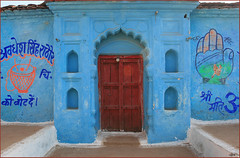The manifestos of the Congress and BJP are available on the excellent India-Elections site maintained by an independent group. A comparison is illustrative. Not only the Congress manifesto looks more "ready", it also is not based on "what other parties do" and "why we are better". It is based on "let us work for you". Of late, India is seeing not a great leader, but a team of good leaders - Sonia, Manmohan, Chidambaram and Rahul. Not only this team is well-educated and humble, they are keen on putting their best foot forward. This team has the will and ability to take the country to the next level.
If such governance continues with a free hand, which it does now, and the governance works as people have voted it to work, it would be the best fortune for India. The lesson for other political parties are:
- Don't be a bum (left) - when govt is trying hard to improve things, please don't come in the way with populist speeches or withdrawal of support,
- Don't play divisive (BJP) - although the regional parties like Mayawati etc are based on one group (in this case Dalits), no national party can stand on only one group. To be able to grow, you must include all.
- Work hard, work well (example of Congress) - there is no room for corrupt/divisive politicians at the top. People at the top must be leaders by example, must be truly concerned with all Indians as one and many.
